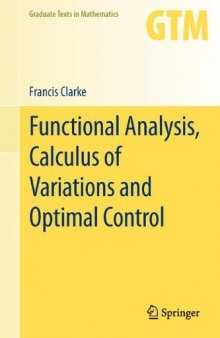 جزییات کتاب
جزییات کتاب
Functional analysis owes much of its early impetus to problems that arise in the calculus of variations. In turn, the methods developed there have been applied to optimal control, an area that also requires new tools, such as nonsmooth analysis. This self-contained textbook gives a complete course on all these topics. It is written by a leading specialist who is also a noted expositor. This book provides a thorough introduction to functional analysis and includes many novel elements as well as the standard topics. A short course on nonsmooth analysis and geometry completes the first half of the book whilst the second half concerns the calculus of variations and optimal control. The author provides a comprehensive course on these subjects, from their inception through to the present. A notable feature is the inclusion of recent, unifying developments on regularity, multiplier rules, and the Pontryagin maximum principle, which appear here for the first time in a textbook. Other major themes include existence and Hamilton-Jacobi methods. The many substantial examples, and the more than three hundred exercises, treat such topics as viscosity solutions, nonsmooth Lagrangians, the logarithmic Sobolev inequality, periodic trajectories, and systems theory. They also touch lightly upon several fields of application: mechanics, economics, resources, finance, control engineering. Functional Analysis, Calculus of Variations and Optimal Control is intended to support several different courses at the first-year or second-year graduate level, on functional analysis, on the calculus of variations and optimal control, or on some combination. For this reason, it has been organized with customization in mind. The text also has considerable value as a reference. Besides its advanced results in the calculus of variations and optimal control, its polished presentation of certain other topics (for example convex analysis, measurable selections, metric regularity, and nonsmooth analysis) will be appreciated by researchers in these and related fields.Table of ContentsCoverFunctional Analysis, Calculus of Variations and Optimal ControlISBN 9781447148197 ISBN 9781447148203PrefaceContentsPart I Functional Analysis 1 Normed Spaces 1.1 Basic definitions 1.2 Linear mappings 1.3 The dual space 1.4 Derivatives, tangents, and normals 2 Convex sets and functions 2.1 Properties of convex sets 2.2 Extended-valued functions, semicontinuity 2.3 Convex functions 2.4 Separation of convex sets 3 Weak topologies 3.1 Induced topologies 3.2 The weak topology of a normed space 3.3 The weak* topology 3.4 Separable spaces 4 Convex analysis 4.1 Subdifferential calculus 4.2 Conjugate functions 4.3 Polarity 4.4 The minimax theorem 5 Banach spaces 5.1 Completeness of normed spaces 5.2 Perturbed minimization 5.3 Open mappings and surjectivity 5.4 Metric regularity 5.5 Reflexive spaces and weak compactness 6 Lebesgue spaces 6.1 Uniform convexity and duality 6.2 Measurable multifunctions 6.3 Integral functionals and semicontinuity 6.4 Weak sequential closures 7 Hilbert spaces 7.1 Basic properties 7.2 A smooth minimization principle 7.3 The proximal subdifferential 7.4 Consequences of proximal density 8 Additional exercises for Part IPart II Optimization and Nonsmooth Analysis 9 Optimization and multipliers 9.1 The multiplier rule 9.2 The convex case 9.3 Convex duality 10 Generalized gradients 10.1 Definition and basic properties 10.2 Calculus of generalized gradients 10.3 Tangents and normals 10.4 A nonsmooth multiplier rule 11 Proximal analysis 11.1 Proximal calculus 11.2 Proximal geometry 11.3 A proximal multiplier rule 11.4 Dini and viscosity subdifferentials 12 Invariance and monotonicity 12.1 Weak invariance 12.2 Weakly decreasing systems 12.3 Strong invariance 13 Additional exercises for Part IIPart III Calculus of Variations 14 The classical theory 14.1 Necessary conditions 14.2 Conjugate points 14.3 Two variants of the basic problem 15 Nonsmooth extremals 15.1 The integral Euler equation 15.2 Regularity of Lipschitz solutions 15.3 Sufficiency by convexity 15.4 The Weierstrass necessary condition 16 Absolutely continuous solutions 16.1 Tonelli's theorem and the direct method 16.2 Regularity via growth conditions 16.3 Autonomous Lagrangians 17 The multiplier rule 17.1 A classic multiplier rule 17.2 A modern multiplier rule 17.3 The isoperimetric problem 18 Nonsmooth Lagrangians 18.1 The Lipschitz problem of Bolza 18.2 Proof of Theorem 18.1 18.3 Sufficient conditions by convexity 18.4 Generalized Tonelli-Morrey conditions 19 Hamilton-Jacobi methods 19.1 Verification functions 19.2 The logarithmic Sobolev inequality 19.3 The Hamilton-Jacobi equation 19.4 Proof of Theorem 19.11 20 Multiple integrals 20.1 The classical context 20.2 Lipschitz solutions 20.3 Hilbert-Haar theory 20.4 Solutions in Sobolev space 21 Additional exercises for Part IIIPart IV Optimal Control 22 Necessary conditions 22.1 The maximum principle 22.2 A problem affine in the control 22.3 Problems with variable time 22.4 Unbounded control sets 22.5 A hybrid maximum principle 22.6 The extended maximum principle 23 Existence and regularity 23.1 Relaxed trajectories 23.2 Three existence theorems 23.3 Regularity of optimal controls 24 Inductive methods 24.1 Sufficiency by the maximum principle 24.2 Verification functions in control 24.3 Use of the Hamilton-Jacobi equation 25 Differential inclusions 25.1 A theorem for Lipschitz multifunctions 25.2 Proof of the extended maximum principle 25.3 Stratified necessary conditions 25.4 The multiplier rule and mixed constraints 26 Additional exercises for Part IVNotes, solutions, and hintsReferencesIndex
 درباره نویسنده
درباره نویسنده

فرانسوا کارکو (به فرانسوی: François Carcopino-Tusoli - Francis Carco) نویسنده، شاعر، روزنامهنگار و ترانهسرا قرن نوزدهم میلادی اهل فرانسه است.
 دانلود کتاب
دانلود کتاب
 جزییات کتاب
جزییات کتاب
 درباره نویسنده
درباره نویسنده
 فرانسوا کارکو (به فرانسوی: François Carcopino-Tusoli - Francis Carco) نویسنده، شاعر، روزنامهنگار و ترانهسرا قرن نوزدهم میلادی اهل فرانسه است.
فرانسوا کارکو (به فرانسوی: François Carcopino-Tusoli - Francis Carco) نویسنده، شاعر، روزنامهنگار و ترانهسرا قرن نوزدهم میلادی اهل فرانسه است. 








 این کتاب رو مطالعه کردید؟ نظر شما چیست؟
این کتاب رو مطالعه کردید؟ نظر شما چیست؟
